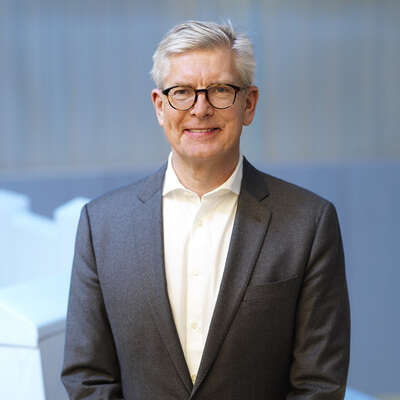Drive, leadership and transformation with Ericsson's President and CEO, Börje Ekholm
"The most important thing is to be present!"
As one of the largest companies on the Stockholm Stock Exchange, Ericsson has quickly managed to transform its operations for a whole new world. During the past tough year, the company's CEO, Börje Ekholm, has shown exceptional leadership. The recipe has included increased investments in new technology, clear communication and a constant focus on the whole.
Börje Ekholm has had many things on his table since he took over as CEO of telecom giant Ericsson in January 2017. Loss has turned to profit, the company's massive investments in the roll-out of the 5G networks have borne fruit, which has been a success not least on the stock exchange where the stock has risen by over 50 percent over the past 12 months. The challenges came on top of an ongoing global pandemic, where Ericsson has managed to enable teleworking for most of its 100,000 employees spread across 180 countries.
Internally, he is happy to hear that he has been described as a down-to-earth rock star, approachable to everyone. Despite his simple appearance, there is a charisma that testifies of a confident leader in both success and adversity.
Do you feel like a down-to-earth rock star?
"Ha ha, maybe not exactly like a rock star! Rather like a country star," says Börje Ekholm, who thus tells us what kind of music he likes to listen to.
"Jokes aside, I think we have co-workers who really 'rock'! Really this is not a question I should answer myself, but I'm probably pretty confident in myself and down to earth. I like the straightforwardness and see myself as unpretentious."
"I like clear and honest communication from our employees and I really appreciate being out and about. That is when I can really see for myself how things are going, which also means that we can do something about potential issues. When I meet customers, I almost always take the opportunity to have the meetings together with our employees in the office. Unfortunately, this has not been possible this year, but we have done it digitally."
How do you want to describe your leadership style yourself?
"I focus my leadership a lot on creating one team. I usually say to my management team that 'you have two jobs – the most important job is Ericsson as a whole, and the second job is to lead the business for which you are responsible'. As a leader, I also want a fact-based and transparent dialogue so that we can make quick decisions."
Do you as a person like to create change?
"Yes, indeed! I enjoy great challenges and working with a team to drive a business forward. It's very inspiring and gives me a lot of energy. I don't think I'm a good administrator.
How would you describe 2020?
"As a company, Ericsson has had a good year, we reached our goals and thus we have turned the company around. But from a more human perspective, the year of the Covid-19 pandemic has put pressure on all our employees. Our priority has been to put the health and safety of our employees, customers and stakeholders first."
"At the beginning of the pandemic, we went overnight to allow approximately 85,000 employees to work remotely and we have continued to do so, while at the same time having a minimal impact on our customers. I am very proud of our results and what we have achieved in 2020."
What have been the biggest challenges for you as a company during this period?
"We have done well, but the pressure on the health of our employees has been evident. Many countries have been completely shut down and clearly this has affected our staff. We have tried to make things easier by being clear in our messages about what applies when working from home, travelling and more. But also by supporting them with, for example, home offices for good ergonomics, help and advice on how to work digitally and we have put a lot of focus on health and well-being", says Börje Ekholm, who believes that it is only possible to work in a virtual environment if you also give employees responsibility for their own delivery.
"And our employees have shown that they want to take that responsibility, the company has delivered in an outstanding way. I am incredibly grateful for everyone's efforts and I am proud of our results!"
What have been your biggest personal challenges as a leader?
“Probably not being able to meet either employees, managers or customers more than just digitally. I've really missed the extra dynamics that comes with meeting physically. And it's harder to get new customers in a special situation like this."
Tell us more about the most important reasons why you have done so well over the past year, not least in terms of developments on the stock exchange?
"In 2017, we chose to significantly increase our investments in R&D, research and development, and since then we have also hired 7,700 engineers. Today, R&D accounts for nearly a quarter of all our employees, which has also meant that we have a technology leadership now that the 5G rollout is accelerating."
"But for me, the stock price is not the important thing. We will build a long-term strong Ericsson and we will do this by focusing on two things in the company: our customers and our team. The shareholders are a consequence of the fact that we have the right employees who make the right decisions towards the customer, then it will also be financially sound."
What is characteristic of leading a company in transition?
"It's a lot about engaging the entire organization in the change. To have a common goal that everyone is working towards", says Börje Ekholm and says that among the toughest challenges has been to really drive a cultural change internally in a large company.
"It's a long-term job that takes time."
Since autumn 2019 Ericsson has internally pursued a global cultural transformation journey, "Ericsson on the Move", with the aim of developing and strengthening the company's culture in five areas: collaboration, fact-based and courageous decisions, rapid implementation, empathy and humanity, and a culture that encourages civil courage.
"Strengthening the way we work in these five focus areas supports our transformation of Ericsson. Our need for change is constant and gives us the opportunity to create an environment where our employees can grow and take us into the future. And already we see very good results in our employee measurements in the form of a positive trend around motivation and commitment, which is absolutely crucial for our long-term success as a company!"
Has the ongoing pandemic even made it easier to create change in certain areas?
"Yes, absolutely! The pandemic has accelerated the pace of digital transformation and confirmed that wireless connectivity is a critical infrastructure that is the foundation of society as a whole. In the end, we will return to more normal conditions, but it will not be as it was before."
"For example, we will see teleworking as part of the new normal. I also think that the pandemic has taught us that it is possible to change much faster than you think, and that is a lesson we can learn from."
Are the changes complete now, what do you need to get even better at?
"No, absolutely not! As I said, a company like Ericsson is constantly changing. We must always be at the forefront of technology and also ensure that we have the best employees to develop our company."
So what are your best advice for leading in change?
"It is to be present in the organization, to see both challenges and opportunities. And then to dare to make the decisions that will drive change forward."
What are the main threats to your continued success?
"To be competitive, we must continue to invest in R&D and increase our market share. And motivated and committed employees are absolutely crucial to our long-term success."
Read about Årets Förändringsledare / Change Leader of the Year Awards here.




